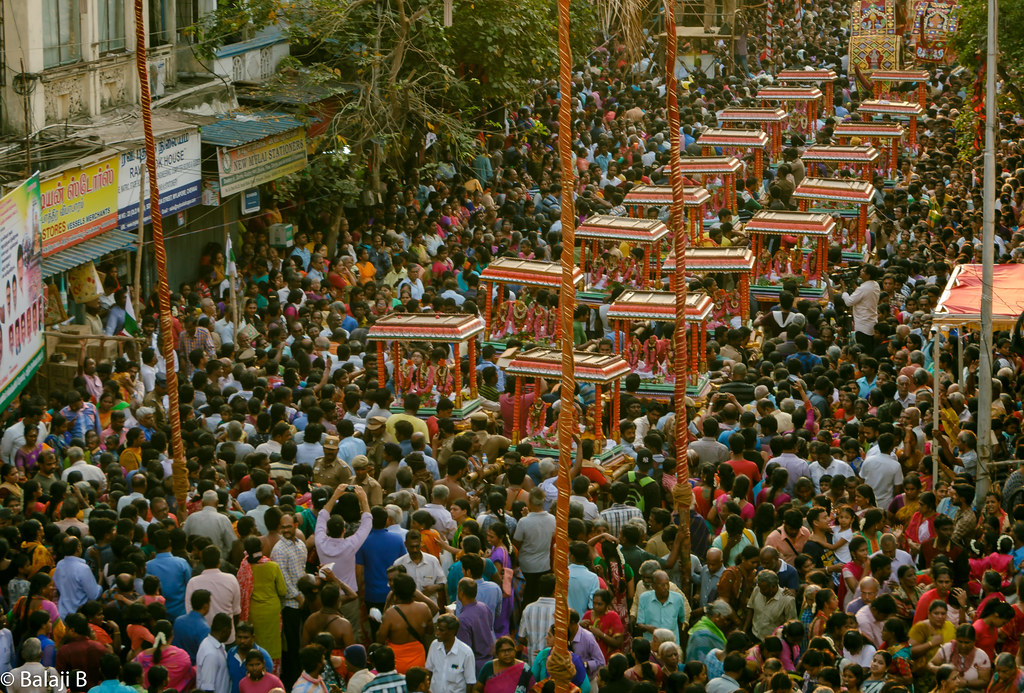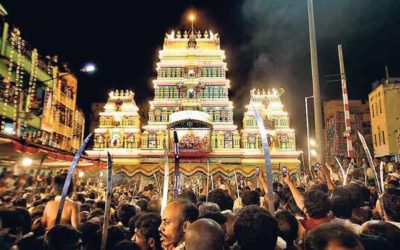Panguni Uthiram is an important day for Tamil Hindus. In the year of 2020, Panguni Uthiram falls on the 07th day of April. It is a special day because the Poornima (full moon) is on the asterism of Uthira on the Tamil month of Panguni, the last month of the year. According to the Brahmanda Purana chapter 13, verse 11, there are six seasons in the year and the month of Panguni is one of two months that makes up the winter season. This day marks the end of winter and the beginning of summer.
Celebration for Lord Shiva and Lord Muruga
Technicalities aside, it is a day of immense celebration for Tamil Hindus. Every Shiva temple and Muruga temple in Tamil Nadu is abuzz with festivities. Generally it is celebrated as a ten-day festival starting with a flag hoisting on the first day. On the fifth day, a decorated cart is dragged in the streets with Shiva sitting inside. On the seventh day, the marriage of Shiva and Shakti takes place. On the eighth day, Lord Shiva himself asks for bhiksha (alms) on the streets. He shows us how to discard our ego through this act. In small villages, one can still see the entire village becoming a festival during these ten days.
In Murugan temples, people carry the kavadi. The women take pots of milk and offer it to the devotees. Many people walk to the Palani Murugan temple barefoot before the start of this festival.
Historical importance
The day of Panguni Uthiram is said to be the day on which many celestial weddings took place. In Valmiki’s Ramayan, Rama and Sita’s wedding took place on this very auspicious day (chapter 71 verse 24). In the Shiva Purana, it is noted that Shiva and Parvati’s wedding took place on this day, as did Sundareswarar and Meenakshi’s wedding. Muruga also married Deivanai on this day.
Festivals celebrated on Panguni Uthiram
According to the legends, it was on this day that Lord Shiva descended as Sundareswarar took Devi Meenakshi to be his bride. The Meenakshi temple in Madurai still stands as a reminder of the time when Meenakshi and Sundareswarar ruled their kingdom. If an unmarried woman takes the vrata (fast) on this day, she is said to be blessed with all auspiciousness for a quick marriage. This is known as the kalyana vrata (marriage fast).
Kaman pandigai is also observed on this day. In the Kandapuranam, the story of Kamadeva (cupid) is described. Love and procreation had ceased to exist in the universe because Shakti had left Shiva to do penance in Kanchipuram. The devas became worried and sent Kamadeva, also known as Manmatha, to aim his love arrows at Shiva. Shiva, angry with Kamadeva for disrupting His meditation, burned him with His third eye. After Rati Devi, Kamadeva’s wife pleaded with Lord Shiva, He allowed Kamadeva to live and do his work on earth.
In his book “Festivals of Tamil Nadu”, M. Arunachalam details the celebrations that happen in Tamil Nadu for Kaman Pandigai. People gather in villages and celebrate for three days. On the third day, Kama is burnt. The people then debate and sing elaborate ballads about whether or not Kama should have been burnt. It is a day of excitement, festivities, and was a major form of entertainment for the village people.
Panguni Uthiram is a day that is less known to the west. Its better-known counterpart in northern India is Holi, the celebration of spring. Panguni Uthiram is day of importance for many people. The entire state of Tamil Nadu can be seen abuzz with festivities during this day and the ten days leading up to it.
Sources
1. Kandapuranam
2. Festivals of Tamil Nadu by M. Arunachalam
3. Ramayan by Valmiki translated by Prasad Shastri
4. Bahmanda Purana translated by Dr. G. V. Tagare



0 Comments